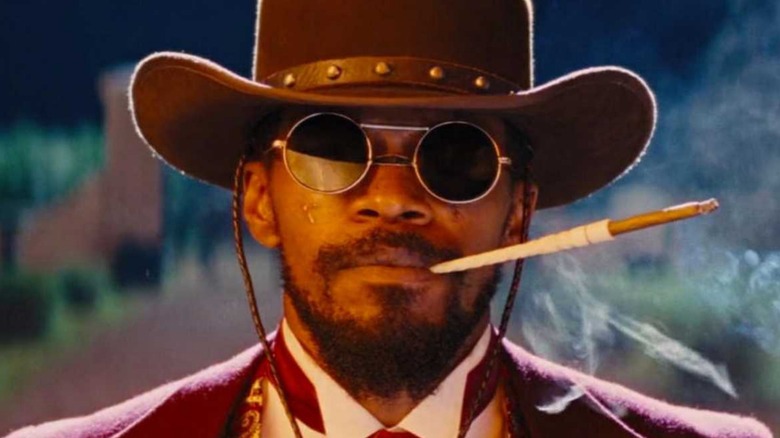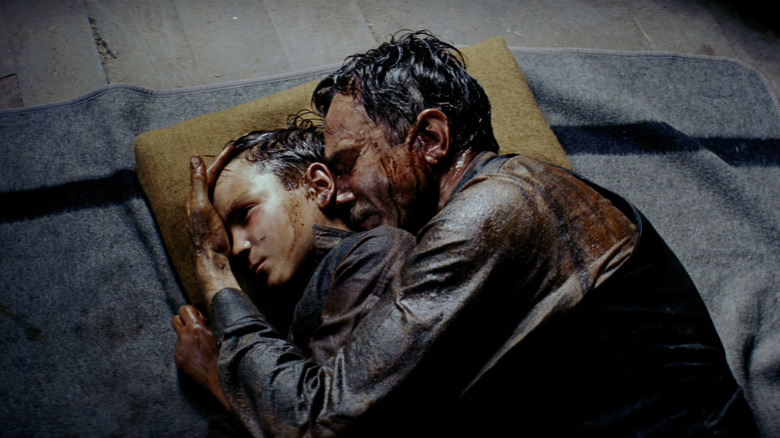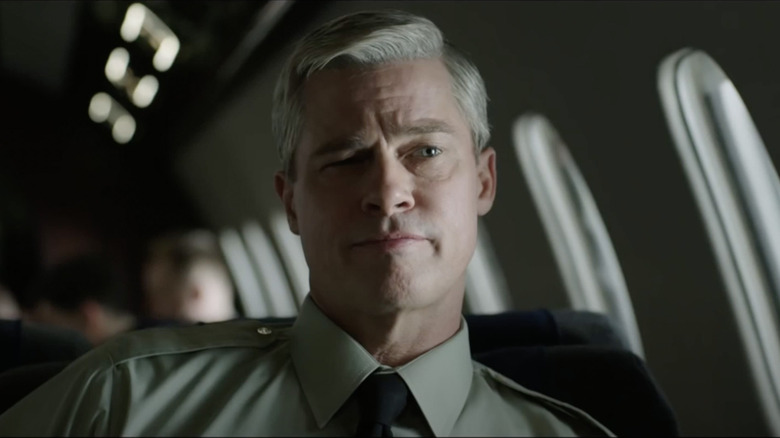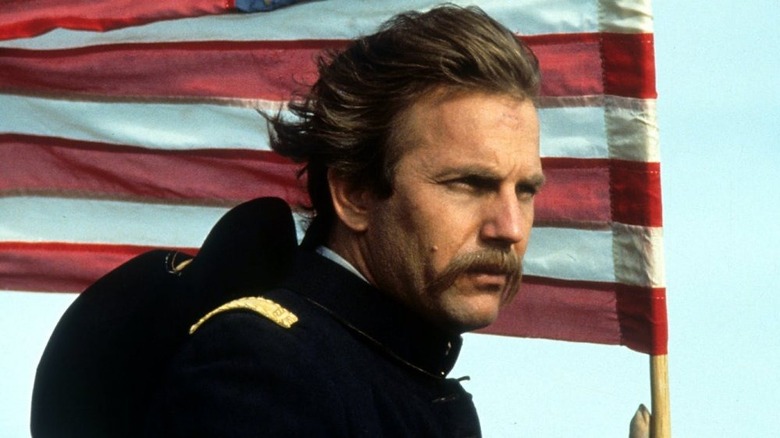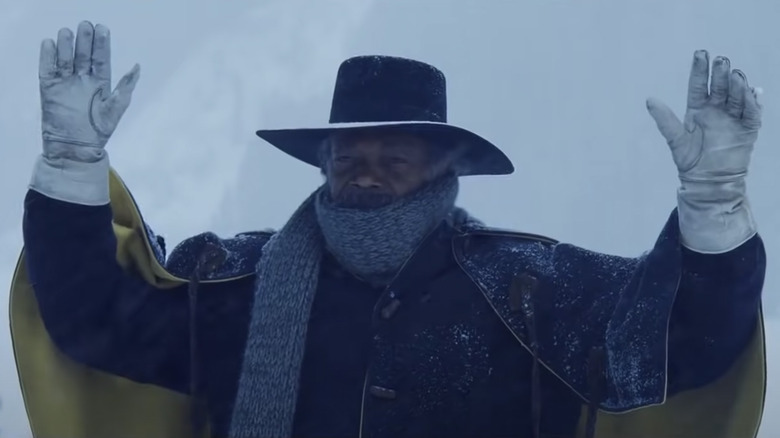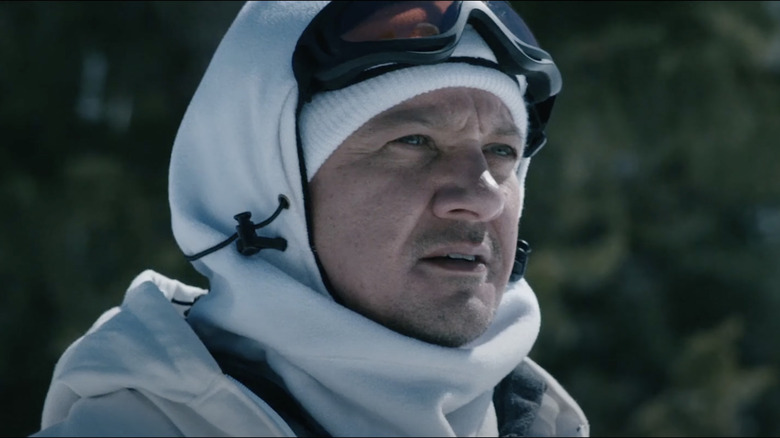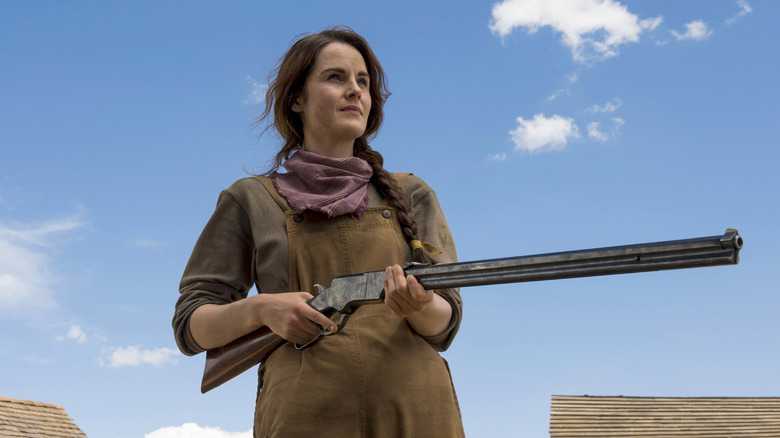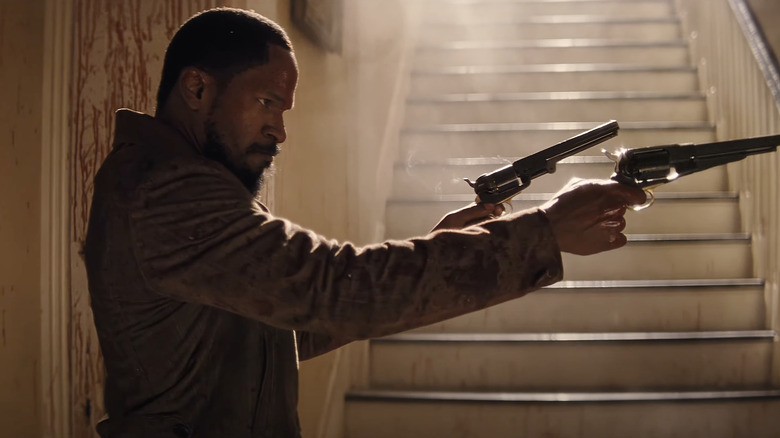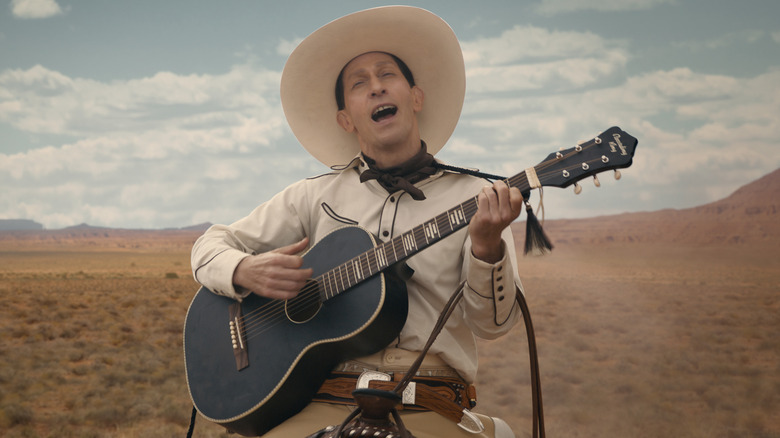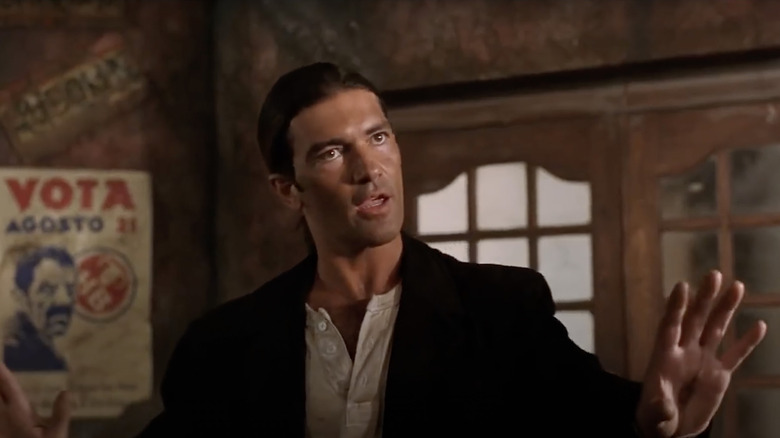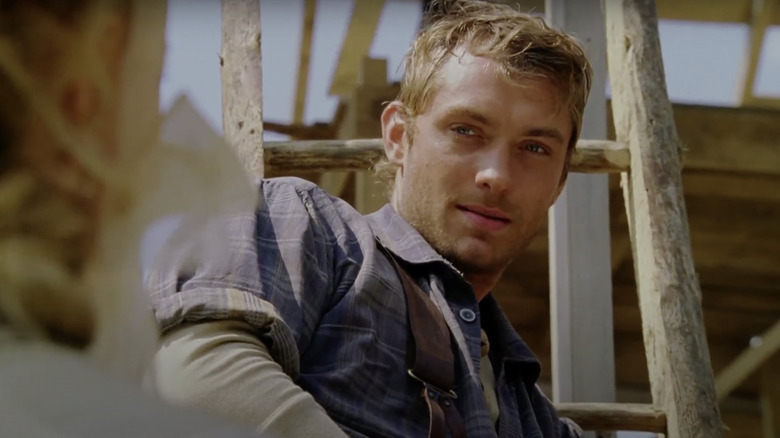The 10 Best Western Movies You Can Stream On Netflix Right Now
The western has met a curious fate. Once among the most reliably popular staples of the Hollywood machine, ask around today and your average film fan under 50 is likely to express disinterest, if not outright disdain, for the genre entirely.
Push a little harder on these unbelievers and you'll hear vague critiques like "they're boring" and "they're all the same." But what these city flickers might not realize is that the western is alive and well. Many excellent westerns are still being made, often without sunset duels or other well-worn tropes, but instead taking the genre's trappings and themes into slightly different settings.
See, westerns aren't truly defined by dusty archetypes, but by stories about wild and wide-open places where ordered society has receded just enough for heroes and villains to duel without the oversight of a strong centralized state. Micheal Mann's "Heat" is a western. "Logan" is a western. "Blade Runner" and "Dune" are westerns. And yes, despite our unscientific polling, streaming studios are still producing traditional westerns, too. Here are 12 of the best westerns that Netflix has made available at the drop of a big-brimmed hat.
There Will Be Blood
"There Will Be Blood" could easily be dubbed the best western ever made if it weren't for a little movie called "Unforgiven" — and, like many other modern films in this broad genre, Paul Thomas Anderson's 2007 masterpiece doesn't have a single swinging saloon door or sidearm shoot-out.
Daniel Day-Lewis plays Daniel Plainview, an aptly named prospector turned proud oilman. Plainview totes around his adorable adopted son to put on a family-man facade for investors, but he's really devoted to his single-minded mission to conquer every oil field in America. His biggest obstacles are not the farmers who are reluctant to sell their land or the inherent danger of the work, but rather Eli Sunday, a charismatic evangelical charlatan played by Paul Dano. At bottom, the men are mirrors, each desperate for control; the preacher himself makes a big show of conducting faith healings and speaking in tongues, and Sunday uniquely sees through Plainview's hustle.
"There Will Be Blood" is a meta-western; the wild west here is a metaphor for western society, writ large. It's the story of one man manifesting a maniacal destiny with such spitting grit that he becomes the embodiment of ambition, capitalism, and the frontier spirit itself. "I drink your milkshake," Plainview shouts at Sunday in the film's grim and hilarious climax. By that, Day Lewis' oilman means that he's single-handedly sucked the west dry, and yet his unquenchable thirst for the blood of the land has not yet been sated.
War Machine
Don't think that "War Machine" is a western? Well, it is, but not just because Brad Pitt spends two hours getting sand kicked in his teeth. "War Machine" is largely about the fall of a west that manifested so much destiny that it became decadent, lost its nerve and its purpose, and had to march east to do the whole thing over.
Pitt plays a comically bow-legged and buffoonish version of General Stanley McChrystal, who you might remember as the army ace who got canned after his hard-drinking staff ran their mouths around a Rolling Stone reporter. Pitt's fictional version of McChrystal marches into his new command post with a hunched-over parody of a cowboy's swagger. He quickly rounds up a posse of pencil-pushing nation builders and sets out to settle the untamed regions of tribal Afghanistan once and for all.
The only problem is that the Afghans aren't all that interested in the glory of General McChrystal. In the best scene of the film, Pitt tries to enlist the help of checked-out Afghan president Hamid Karzai, played hilariously by Ben Kingsley, with the optics of his aggressive new offensive. Karzai, bedridden, Kleenex stuffed in his nose and watching "Dumb and Dumber," kindly replies with a suddenly invigorated air of wisdom, "You have my approval, General. We both know it was never mine to give. But I thank you for inviting me to participate in the theater of it all!"
Dances with Wolves
There's been a fashionable attempt to lump Kevin Costner's masterpiece in with a heap of other "white savior" films that decenter Native American stories in favor of pampered white faces. But that critique, while perhaps true, forgets the context of "Dances with Wolves."
Costner's epic is about a lone Union soldier stationed at an outpost so remote that he must commune with the Lakota natives who actually inhabit this pristine western landscape. What's important to remember is that in 1990, when "Dances with Wolves" was released, it was in conversation with every movie before it. Costner was decrying decades of westerns in which native tribes were depicted as little more than savages and targets for courageous, gun-wielding cowboys.
Even in the most morally complex of the old westerns, John Ford's 1956 classic "The Searchers," John Wayne plays a cowboy so racist that the whole point of his search is to murder a young white girl abducted by natives because he feels that she is morally ruined, although he comes around in the end. The main character in "Dances with Wolves" embarks on a similar arc of enlightenment, but his actually takes you on a 19th-century man's spiritual journey, rather than merely dragging you along for the ride. Costner's character doesn't just abstractly discover the Lakota's right to live, but is rather so awed by the dignity of their lives that he must pick between his own culture and this new one, even knowing the inevitable cost.
The Hateful Eight
Quentin Tarantino didn't build "The Hateful Eight" for Netflix. Can you imagine the film enthusiast actually signing a deal with a streaming service to have his work debut on the small screen? It's almost laughable. Tarantino openly despises digital filmmaking. When the original script leaked, forcing Tarantino to rewrite it, one of the details that was widely reported was the director's enthusiastic plan to shoot on expensive and rare 70mm film stock, according to The Wrap. This is basically an IMAX-size shot, and it wouldn't fit neatly onto your TV without an artistically tragic crop.
If you got to see a 70 mm print of this excellent comic-western, you know that it's an immensely clever film, directed more like a live stage play than Tarantino's more specifically cinematic work. That also means that it's an extremely chatty film, even by Tarantino's standards, and very long to boot.
Tarantino loves using chapter cards in his films, naturally breaking his work into sections. But even with those interludes, this is one film that benefits from actually being severed into TV-length episodes. Flip on the "The Hateful Eight" extended version on Netflix, which is cut into four roughly 50 minutes pieces, and you'll marvel at how this seemingly subtle change turns a three-and-a-half-hour film into a gripping TV show that you can't help but binge in one sitting.
Wind River
"Wind River" is a satisfying neo-western from writer-director Taylor Sheridan, the creator of "Hell or High Water" and "Sicario," who is fast becoming a creator you show up for when he's got a project coming out.
Despite Sheridan's talent as a writer, the film's only major flaw is that some of the dialogue sounds less like how humans speak, and more like how screenwriters think. "I just wanted the bad to go away," Jeremy Renner mourns. Renner is excellent, as always, playing a wildlife tracker recruited to help a murder investigation in the frozen expanse of Wyoming's Wind River Indian Reservation. The hunt comes just as he's dealing with the death of his own child. "I wanted answers to questions that couldn't be answered," he says.
Dialogue quibbles aside, "Wind River" is also a solidly entertaining thriller, with a sprinkle of social justice. The film is semi-based on media reports of undercounted numbers of Native American girls who go missing each year. It's not clear why this is, but the film's most tense standoff partially points to jurisdictional dysfunction between local, federal, and tribal authorities. Leading the investigation into the missing Arapaho girl is an FBI agent played by Elizabeth Olsen. It's a snowy and sordid tale, and despite the film's modest dash of political messaging, it's actually something more conventional: a story of one man using his woodsy wiles to right a wrong in a barren place where survival isn't a given.
Godless
Forgive us, but this isn't technically a movie. It's a TV series — or, more specifically, a seven-episode "limited series." Netflix has been doing more of this lately. Apparently, they have data demonstrating that shows that run beyond two or three seasons don't drive subscribership, and are simply too expensive to maintain as casts and crews demand more cash, at least according to Deadline.
Business aside, this new reality is great for fans of the traditional filmic format – you know, stories that actually have endings. "Godless" follows a feud between two generations of outlaws: Jack O'Connell plays the younger man, who is hunted by his former mentor, played by Jeff Daniels. O'Connell takes refuge in a New Mexico town inhabited almost exclusively by women after a terrible mining accident kills all the fellas. Fortunately, Michelle Dockery of "Downton Abbey" fame is there, but this time she's heavily armed, and isn't likely to need mourning attire after things get bloody.
Django Unchained
"Django Unchained' is really the apotheosis of Quentin Tarantino's worship of violent genre films. It's the western reimagined as a racial revenge fantasy, sort of like how Tarantino rewrote the WWII genre so a group of Jewish guerilla fighters could blow away Hitler in "Inglourious Basterds."
Jamie Foxx plays a freed slave turned bounty hunter who gets to gun down the masters and free his love in the process. Tarantino originally wanted Will Smith for the role, but the Fresh Prince told The Hollywood Reporter that he rejected the auteur's offer when Tarantino wouldn't turn his genre film into a sappy love story. Big Willy then made "Men in Black 3" and "After Earth" instead, so we can all have a good cry imagining what Tarantino could've done with Smith playing against type.
In this universe, Foxx's turn as Django made for a gory masterpiece, blending the western and blaxploitation genres. "Blaxploitation" was initially a pejorative, but Tarantino grew up loving these pulpy low-budget movies unironically, and first put his money where his mouth is with "Jackie Brown," the only film in his canon that isn't an original screenplay.
Django also delivers a Quentin-verse specific form of racial catharsis. Foxx's companion in the bounty hunting business is the charismatic Christoph Waltz, who plays a dashing German dentist with a zeal for tracking down outlaws. Tarantino really took it to the Germans with "Inglourious Basterds" in 2009, but made sure to depict one of Deutschland's own as a racially enlightened hero three years later for "Django."
The Ballad of Buster Scruggs
Film fans were thanking the movie gods when Joel and Ethan Coen decided to drop a western on Netflix. And, for the first time ever, the cinephile siblings actually shot a film on a digital camera, according to Variety. They used Hollywood's most popular model, the Arri Alexa, which cinematographers favor for its accurate skin tones and the way that it mimics the look of genuine film stock.
That helps "The Ballad of Buster Scruggs" retain the rustic look of a western, but with the 4K clarity viewers now expect. Another first for the brothers is the anthology format. Scruggs features six stories about the American west, each with the Coens' midnight black sense of humor. "We've always loved anthology movies, especially those films made in Italy in the '60s which set side-by-side the work of different directors on a common theme," a PR statement by the Coens (via Esquire) read.
The film opens with the story of the eponymous Buster Scruggs, a yodeling dandy on horseback, played by the unassuming, buck-toothed Tim Blake Nelson. But Scruggs isn't just a happy-go-lucky bard. He's also lightning-fast on the draw, with a mouth to match. His dorky demeanor and acid tongue provoke lots of hot-headed cowpokes, but, of course, the Coens don't let this story slump into genre conventions. Suffice it to say, in the "Scruggs" anthology, everybody earns what's coming.
Desperado
Whether you rate "Desperado" as a classic or a pulpy piece of trash probably depends on how old you were when you first saw it. But however you feel about this south-of-the-border shoot-em-up, it did give us one of the most entertainingly violent filmmakers in Hollywood: Robert Rodriguez.
"Desperado" is a familiar tale in the western genre, focused on a gunslinger hellbent on revenge. The hero, El Mariachi (Antonio Banderas), poses as a traveling musician in his quest to take down the cartel kingpin who killed his love. Inside his guitar case, however, is a lot more firepower than a six-stringed Fender. Adding to the authenticity of this finger-picking badass, Banderas himself actually sings on the soundtrack.
"Desperado" is basically a remake of Rodriguez's 1992 film "El Mariachi," which the director shot for just $7,000, according to the Washington Post. With a budget of 1,000 times that for this sequel — still a modest $7 million – Rodriguez really puts it all on screen. It's his version of a Hong Kong-style action film. Selma Hayek is a dazzling feast for the eyes, and Danny Trejo plays the exact kind of knife-wielding maniac that led to his later meme-ifcition as "Machete." This is the only outright action flick on this list, but without its success, the director would never have given us "From Dusk Till Dawn" or his stylish take on film noir in "Sin City. " That's not a cinematic wasteland that anyone wants to live in.
Cold Mountain
Westerns and Civil War dramas could be classified as different categories, if one wanted to be persnickety. And, if you watch the original "Cold Mountain" trailer, back in 2003 Miramax's editors really made the adventurous drama look like a romance novel come to life.
That's not totally inaccurate. It's definitely a weepy melodrama. "Cold Mountain," based on the novel of the same name, is the story of two lovers played by Jude Law and Nicole Kidman who are separated by the Civil War. Kidman is just okay, her southern drawl sometimes undermined by her native Aussie accent. Young Jude Law is the one to watch here. He's the film's Fabio, but with more closely cropped blonde locks. He's chased relentlessly by a bizarro version of himself: an even younger and totally unrecognizable Charlie Hunnam, in creepy white makeup as the albino villain.
"Cold Mountain" is definitely ambitious. It had an $80 million budget, and cost $25 million to market, notes the New York Times. Renee Zellweger also won an Oscar for her supporting role. The film has lots to say about the folly of man, and that's all good, but mostly it's just a big beautiful spectacle that effectively harkens back to grand old Civil War epics like "Gone With The Wind."
